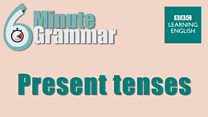Unit 16: Towards Advanced
Grammar, news, vocabulary and pronunciation
Select a unit
- 1 Towards advanced
- 2 Towards advanced
- 3 Towards advanced
- 4 Towards advanced
- 5 Towards advanced
- 6 Towards advanced
- 7 Towards advanced
- 8 Towards advanced
- 9 Towards Advanced
- 10 Towards Advanced
- 11 Towards Advanced
- 12 Towards Advanced
- 13 Towards Advanced
- 14 Towards Advanced
- 15 Towards Advanced
- 16 Towards Advanced
- 17 Towards Advanced
- 18 Towards Advanced
- 19 Towards Advanced
- 20 Towards Advanced
- 21 Towards Advanced
- 22 Towards Advanced
- 23 Towards Advanced
- 24 Towards Advanced
- 25 Towards Advanced
- 26 Towards Advanced
- 27 Towards Advanced
- 28 Towards Advanced
- 29 Towards Advanced
- 30 Towards Advanced
Session 5
Tim's Pronunciation Workshop: pronouncing 'can'
How do fluent speakers of English pronounce the word 'can' in natural speech? Tim explains...
Activity 1
Tim's Pronunciation Workshop: 'can'
Do you think I can open this can?
Tim's back in his pronunciation workshop. This time he's finding out how English speakers sometimes pronounce the word 'can' - and he's wondering what to have for lunch...
To do
Take a look at the video, then try the activity to do some practice.
Watch the video and complete the activity

Tim
Hi. I'm Tim and this is my pronunciation workshop. Here, I'm going to show you how English is really spoken. Come on, let's go inside. You see this? This is my lunch - well, either that, or it's some cat food. Anyway, do you know what we call this container? It's a can, right? Now this has the same spelling as the modal 'can', and the same pronunciation, hasn't it? Or has it? Listen carefully when we ask some people in London how many languages they speak.
Voxpops
I can speak one language.
I can speak two languages.
I can speak two languages.
I can speak two languages, English and Hindi.
Tim
They all used the word 'can'. But they didn't pronounce it as /kæn/. Listen again. How do they pronounce it?
Voxpops
I can speak one language.
I can speak two languages.
I can speak two languages.
I can speak two languages, English and Hindi.
Tim
In fluent everyday English, when the modal auxiliary 'can' is unstressed, its pronunciation changes to /kən/. 'I /kæn/ speak four languages' becomes: 'I /kən/ speak four languages'. This is what's known as a weak form and it can occur in questions as well. Here are some more examples.
Examples
Can you help me bring in the shopping, please?
I can swim further than I can run.
You can succeed if you work hard.
How far can you throw a tennis ball?
Tim
Right, so you've heard the examples, and now it's your turn. Are you ready? Listen and repeat.
Examples
Can you help me bring in the shopping, please?
I can swim further than I can run.
You can succeed if you work hard.
How far can you throw a tennis ball?
Tim
Well done. Now remember, if you want to learn more about pronunciation, then please visit our website, bbclearningenglish.com. And that is about it from the pronunciation workshop for this week. I'll see you soon. Bye bye! Right, now, time for lunch I think! Ahh. Do you think I can open this can, without a can opener? Hey. Oh no – it is cat food. Never mind, we can eat cat food, can't we? You know what? That is not bad. Salmon? Rabbit? Mouse?
To do
So that's how and why 'can' is often pronounced as a weak form in natural spoken English. Of course, when we want to stress 'can', we pronounce it as /kæn/. Now try this activity to get some more practice.
The 'can' game
5 Questions
How many examples of the weak form of 'can' - pronounced /kən/ - are there in each sentence? You decide...
Help
Activity
How many examples of the weak form of 'can' - pronounced /kən/ - are there in each sentence? You decide...
Hint
When English speakers say the word ‘can’, it is frequently unstressed. The /æ/ in the middle becomes schwa: /ə/. But when 'can' is stressed in a sentence, it is pronounced /kæn/.Question 1 of 5

Help
Activity
How many examples of the weak form of 'can' - pronounced /kən/ - are there in each sentence? You decide...
Hint
When English speakers say the word ‘can’, it is frequently unstressed. The /æ/ in the middle becomes schwa: /ə/. But when 'can' is stressed in a sentence, it is pronounced /kæn/.Question 2 of 5

Help
Activity
How many examples of the weak form of 'can' - pronounced /kən/ - are there in each sentence? You decide...
Hint
When English speakers say the word ‘can’, it is frequently unstressed. The /æ/ in the middle becomes schwa: /ə/. But when 'can' is stressed in a sentence, it is pronounced /kæn/.Question 3 of 5

Help
Activity
How many examples of the weak form of 'can' - pronounced /kən/ - are there in each sentence? You decide...
Hint
When English speakers say the word ‘can’, it is frequently unstressed. The /æ/ in the middle becomes schwa: /ə/. But when 'can' is stressed in a sentence, it is pronounced /kæn/.Question 4 of 5

Help
Activity
How many examples of the weak form of 'can' - pronounced /kən/ - are there in each sentence? You decide...
Hint
When English speakers say the word ‘can’, it is frequently unstressed. The /æ/ in the middle becomes schwa: /ə/. But when 'can' is stressed in a sentence, it is pronounced /kæn/.Question 5 of 5

Excellent! Great job! Bad luck! You scored:
End of Unit 16
We hope that was useful. In Unit 17, Dan is going to correct some typical English learner errors. In News Review and LingoHack you can find out which words are making the headlines - and Tim will be back with the pronunciation workshop as usual. See you there!
Session Vocabulary
Pronunciation of 'can'
In fluent everyday speech when the modal auxiliary ‘can’ isn’t stressed the pronunciation becomes /kən/.Some examples of phrases where this might happen include:
- I can speak fluent Japanese.
- Can you bring the shopping in please?
- How long can you hold your breath?


